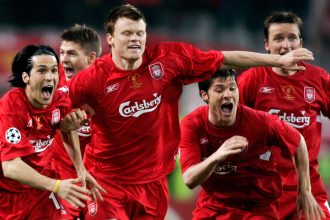The chaos of MLS's postseason proves that soccer in the U.S. exists separate from Europe, with no need to compare
Every now and then, a clip of former Manchester United center back Rio Ferdinand goes viral. The Englishman is asked to compare and contrast Cristiano Ronaldo and Lionel Messi, and expertly dodges the question: "They're just phenomenal to watch. People try to make comparisons of who's better or whatever… just enjoy it, man."
The video is usually the subject of Internet memes. Recent usages include: "Jamaican patties are way better than samosas", "R9 or Mbappe?" and "I can't believe Jurgen Klopp has accepted to make a documentary in his final season at Liverpool."
In isolation, it's a silly quote from a former footballer trying to avoid answering a divisive question. But zoom out, and he makes an important point. Comparisons in soccer tend to be rather arbitrary. Unless there is an actual competition, played out in 90 minutes, then this whole thing is just waffling and social media debates.
And the words also ring true when it comes to comparing the relative quality of global leagues. A common knock on Major League Soccer, and the American game more broadly, is that the standard isn't – and will never be – as high as the Premier League. This is not a revolutionary thought, and although these things can improve, pushing to be "better" than a 100-year-old institution is a fairly arbitrary task.
Instead, MLS has steadily proved that it exists in an adjacent, independent realm. MLS stands just fine on its own, not just in relative terms to any other league. Comparisons are silly, and after an MLS playoffs in which not a single top seeded team is playing in the final four, the chaotic appeal of soccer in this country has never been more clear.
GettyUpsets, upsets, and more upsets
Apple TV executives probably smashed iPads against the wall when Lionel Messi and Inter Miami were bounced from MLS playoffs in the first round. And with good reason. Apple, after signing a massive $1 billion deal with MLS for its streaming rights over the next 10 years, undoubtedly were counting on Messi to win this thing. Watch any game, and it is still stuffed with Messi content. Here he is, in a beer commercial. There he is, hugging David Beckham in a bright pink shirt.
Did you know that the guy with eight Ballons d'Or now plays in America?
Of course, it's excellent for business. Messi's presence sent streaming subscriptions through the roof, while also further galvanizing interest in American soccer. It was Beckham-adjacent, 15 years later. But zoom out, forget the eventual winners and losers, and these few weeks have been immense entertainment.
Messi's Miami won Game 1 before losing the last two contests of the best of three series – and were expertly carved apart by a smart Atlanta United team. Brad Guzan, 40 years old and revitalized, was pushed into the net by an angry Luis Suarez, and laughed in his face when they collided.
If this were any other league, an upset of this magnitude would be celebrated. A mid-table team, who scraped into the playoffs, bounced the title favorites – and did so in style. That's sporting jeopardy at its best.
AdvertisementImagnWhat makes MLS good
There is, in fact, more to MLS than just pllayoff chaos. Sure, the format is fairly unique to American sports, and will, one would hope, stay part of the league setup for the foreseeable future. It is also true that the introduction of a promotion/relegation would seem unlikely (although watching the two New York sides play each other on the final day of the season trying to avoid relegation would be fantastic viewing.)
Such is the relative novelty of the league that there is plenty of room for creativity here. From retro kits – the Miami ones this year were a thing of beauty – to the nicknames of teams, there's a real beauty to how this has been manufactured. El Trafico, Hell is Real and Cascadia Cup are all tremendous labels for derbies.
And then there are the games themselves. "MLS after dark" trends on social media seemingly every week – and refers to the obligatory chaos that comes with every round of competition. There was the game between Colorado and Real Salt Lake (also audaciously named), in which Colorado led 3-2 with five minutes remaining, before conceding three times in five minutes to lose 5-3.
There was Kellyn Acosta's stoppage time goal from the half way line that was carried by the Chicago wind into the back of the net. NFL quarterback Patrick Mahomes told Lionel Messi to "have fun" before a game against Sporting KC. Referees made VAR announcements as dramatic as possible. At one point, on May 15, there was a raccoon on the field in Philadelphia for 161 seconds. These things are all absurd – and immense fun.
Getty Images'The MLS player'
There is an anecdote in Steven Gerrard's autobiography in which the Liverpool captain describes looking around the dressing room, and knowing, before a ball is kicked, that two new signings – Iago Aspas and Luis Alberto – will never make it in the Premier League.
"Straightaway, as soon as I saw them in the dressing room, I knew they weren’t going to make it in the Premier League. It boiled down to physique. They had the bodies of little boys – they looked about 15. I thought ‘Jesus, how are you going to cope against John Terry, Ashley Williams and Ryan Shawcross?' " Gerrard wrote.
And he was right. Neither made an impact for Liverpool. But Aspas went on to have an immensely successful La Liga career, spurned offers from Barcelona and Real Madrid to stay at his boyhood club Celta Vigo, and played for his national team 20 times. Alberto became a mainstay for Lazio, won the Coppa Italia, was named in the Serie A team of the year in 2020, and has also represented Spain.
The broader point is that one footballer who excels in one league, may not be as successful in another. Two diminutive Spanish playmakers couldn't make it in England, but put them in continental Europe and they thrived.
MLS has much the same dynamic. Perhaps the poster child of it all is Riqui Puig. He came through Barcelona's famed La Masia academy, but barely sniffed the field in Spain. He was a failed prospect in the eyes of the Barcelona faithful. But when thrown into MLS, and given time to adapt, Puig has become the perfect playmaker.
The midfielder has all the tools to be successful in this league. He thinks faster than everyone else on the pitch, and can pick a pass more effectively – just ask Gabriel Pec, who benefitted from a wonderful curved through ball on Sunday night. And, most importantly, Puig has the legs to deal with the frantic pace of this whole thing. Lionel Messi will probably win MVP, but Puig might be the best He is the reason the Galaxy are positioned to win their first MLS Cup in 10 years. And at 25, under contract to 2027, he doesn't seem to be going anywhere anytime soon.
There are similar stories to be found elsewhere. FC Cincinnati's Luciano Acosta, among the league's best, took no time to prove that he was too small for Liga MX. Cucho Hernandez never made it at Watford, and landed with Columbus after a series of middling loans. Both of them have the quality to play in Europe. But it's a different sort of game over there. Here, they can thrive – and will probably round out MVP voting behind Messi.
Of course, it's not all just about global players finding their way to MLS – the U.S. is also producing some incredible academy players. Cavan Sullivan is the highest profile example. He signed a deal with Manchester City at 14, and is the next great hope. Want proof that American soccer works? Here's a Phil Foden lookalike with bleached blonde hair who is pretty good at this sport.
ImagnEmbracing differences
The reasons for a negative perception of MLS are numerous. It is not, we are told, America's sport. They do it wrong. Detractors insist that its very name in the United States – soccer, a term the English made up at Oxford in the 1880s – is reason alone to brush the league aside. Add the fact that some teams have turf fields, and that the league has a playoff system and a calendar that doesn't align with Europe, and MLS is, well, wrong.
But it is those very discrepancies and differences that make it entertaining. It has been like this for a long time. There were the penalty shootouts that started 35 yards from goal, and ambitious ways of reinventing badges and jerseys. MLS was uniquely American from day one, and even when it started to embrace European stars, it could never truly change.
The reported interest by commissioner Don Garber and MLS executives to shift to a European calendar, then, is confusing. The Athletic reported that MLS has entered discussions with a view of aligning with the global system more effectively. Transfers, in theory, would be easier, while the clash of MLS and international breaks would either removed – or at least the burden lightened. But the implicit point here – the one that will probably draw the casuals – is the cadence of it all.






